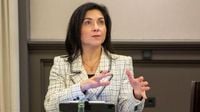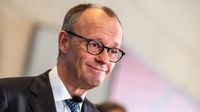On April 28, 2025, the Christian Democratic Union (CDU) officially announced its cabinet appointments for the anticipated black-red federal government, marking a significant moment in German politics. Led by Friedrich Merz, the CDU has selected a mix of experienced politicians and newcomers from the business sector to fill key ministerial roles.
Among the most notable appointments is Johann Wadephul, who is set to become the Foreign Minister, making him the first Christian Democrat to hold this position in almost 60 years. Wadephul, 62, has been a member of the Bundestag since 2009 and recently served as the deputy leader of the CDU/CSU parliamentary group, focusing on foreign and security policy.
Another key figure in the new cabinet is Katherina Reiche, who will take over as Minister of Economic Affairs. Reiche, 51, is a seasoned politician with extensive experience, having served as a Bundestag member from 1998 to 2015 and as Parliamentary State Secretary in both the Ministry of the Environment and the Ministry of Transport. Reiche's appointment is particularly significant as she becomes the first woman from East Germany to head this ministry.
In a surprising move, the CDU has appointed Karsten Wildberger as the head of the newly created Ministry for Digital Affairs and State Modernization. Wildberger, currently the CEO of Ceconomy AG and MediaMarktSaturn Group, brings a wealth of experience from the business world, having previously held executive positions at Eon, Telstra, and Vodafone.
Thorsten Frei, 51, will assume the role of Head of the Federal Chancellery. Frei, who has been a member of the Bundestag since 2013, previously served as the first parliamentary manager of the CDU/CSU parliamentary group. His close ties to Merz suggest a strategic choice aimed at solidifying the party's leadership within the government.
Other notable appointments include Patrick Schnieder as Minister of Transport, Nina Warken as Minister of Health, and Karin Prien as Minister of Education and Family Affairs. Warken, 45, has been a Bundestag member since 2018 and previously served as the parliamentary manager of the CDU/CSU parliamentary group. Prien, 59, has been the Minister of Education in Schleswig-Holstein and is expected to expand her role in the new cabinet.
Wolfram Weimer, a well-known publicist and former editor of major German publications, will become Minister of State for Culture and Media. This appointment reflects the CDU's commitment to integrating cultural leadership within the government framework.
The CDU's announcements come at a time when the party is also finalizing its coalition agreement with the Social Democrats (SPD), who are conducting a member survey to finalize their cabinet selections. The SPD is expected to announce its ministers before May 5, 2025.
As the CDU prepares for the upcoming government formation, Merz is anticipated to be elected Chancellor by the Bundestag on May 6, 2025. This election will mark a pivotal moment for the CDU as it seeks to reclaim its influence in German politics after a period of challenges.
While the CDU has expressed confidence in its selections, some appointments, particularly that of Katherina Reiche, have sparked controversy due to her past comments on LGBTQ+ rights. Reiche has faced criticism for her statements opposing the equality of same-sex partnerships, which she described in a 2002 interview as an "attack on marriage and family." In 2012, she reiterated her stance, stating, "Our future lies in the hands of families, not in same-sex partnerships." These remarks have led to a mixed reception regarding her appointment to a prominent cabinet position.
As the CDU moves forward, the party's leadership hopes to balance its traditional values with the demands of modern governance, particularly in areas such as digitalization and economic development. The upcoming coalition negotiations with the SPD will further shape the direction of the new government.
In addition to the cabinet appointments, the CDU has also named several parliamentary state secretaries, including Gitta Connemann as the Parliamentary State Secretary in the Ministry of Economic Affairs and Michael Meister as Minister of State for Federal-State Cooperation. These roles are designed to enhance the party's operational effectiveness within the government.
With the CDU's cabinet list now public, all eyes will be on the small party conference later today, where the coalition agreement is expected to be approved. A successful endorsement from the party delegates is seen as crucial for establishing a stable government coalition with the SPD.
As Friedrich Merz prepares to take on the role of Chancellor, the CDU's strategy seems focused on blending experienced political leadership with fresh perspectives from the business community. This approach may prove essential in navigating the complex challenges facing Germany in the coming years.






